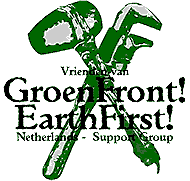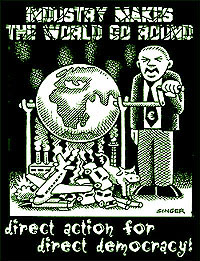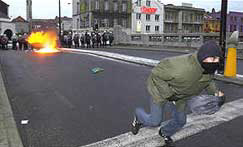|
from 16 december 2001 blue vol II, #15 |
|
|||
|
An eco-activist occupation of the CEFIC offices, Brussels EU summit, Dec 13, 2001 by Vrienden van GroenFront!
Around 7.30 AM on Wednesday December 12, around 50
mainly Dutch and Flemish eco-activists stormed into
the Brussels office of CEFIC. Within ten minutes, the
staircase-shaft was barricaded and the few employees
already present were bonjoured out of the building. In
the end, we managed to enter the fourth closed off
floor of the sizable building, as well as the large
balcony, where banners were dropped stating
exclamations such as "CEFIC = bioterrorism". In the
meanwhile, another group of 50 people arrived outside
with art and samba, right after they distracted police
attention converging at a metro station. Twenty pages
of background info on the chemical lobby appeared on
the internet and was handed out as a brochure.
CEFIC's member companies (BP, Aventis, Unilever etc)
are responsible for 30% of the worlds chemical
production and the accompanying pollution. The lobby
organization has hundreds of thousands of workers and
hundreds of billions of turnover to have it's way with
European politicians. It's a club that has thus far
remained pretty much in the background. The aim of the
organization is:
"...to be a reliable spokesperson
for the industry and to offer our members the service
they need to maximize their profits and reduce their
expenses."
CEFIC is successful. Recently, proposals for European legislation on
chemicals were greatly weakened. Less successful are
the concrete results of CEFIC's programme of
'voluntary initiatives' to help the environment, that
it says to be so proud of. CEFIC can not mention any
concrete result – these programmes exist merely to
greenwash the sector's image.
Internal memoranda we accidentally tripped over
revealed CEFIC is lobbying to get the European
Commission to undermine publication of results of
animal testing and genetic experiments. It argues the
competitive position of the European corporations
obviously have to be protected at all costs. The
wording in all these texts is informal, all suggested
concept-regulations of the Commission are neatly
repeated with suggestions on what needs to be altered.
Because of the chaos, it could of course hardly be
avoided that some of the dossiers were misplaced...
Eviction
The first police managed to get in through the first
floor window. Later a large mass of riot police
entered through the the staircase door that was broken
open by security personnel. After the occupants
running around were dragged away with some violence,
eight activists remained chained down with a new model
of double lock-ons (metal tubes to lock your arm in).
When the first aid person that had been given the
grant to remain until the last of these people were
removed, was dragged away anyway, a group of arrested
activists demanded the could return or they would not
cooperate in any way. The first aid activist could
return then.
A more talkative policeman complained to
an activist about the minimal ingenuity of the
technical service of the Belgian police, although they
had had some training by the Dutch technical squad
after the anti-Betuwe-trainline squat evictions last
year. After a first attempt with a pneumatic long
cutter, after eleven they finally managed to open a
first lock-on pretty cautiously. The procedure for the
next one was a tad more sadist. A locked-on activist
was pulled up by the pressure points in her neck, and
police said this torture would only stop after her
lock-on partner de-attached himself.The last people
were brought into the gendarme station still locked-on
after a four hour occupation. In the meanwhile the
first people arrested had to wait in a bus tied with
tie-ribs (plastic handcuffs) for two and a half
ours.Later, the streets around the station were closed
with barbed wire to stop a solidarity noise
demonstration from reaching the imprisoned.
Deportations
First the police stated the
coach would be too full and they would go in another
van to Holland, so we said to exchange them with three
Dutch people. In the end some cop would go inside the
station to discuss our demands, so he said. When the
bus tried to leave, activists pushed towards the front
of the coach and people started climbing out of the
roof windows to stop the bus from driving. Neckbending
and beating by the police could not get us back into
the seats, so finally things calmed down a bit again
and police suggested to go back into the station where
our comrades were remaining. There we staged a sit-in
in the hallway. Finally, the police stated we were
waiting for a decision from the ministry of the
interior on our demands, which we could wait for in
the cell.
So the strange situation rose that we
remained in the cell again for two hours
semi-voluntarily without any legal status. At the cell
door the police again became violent; it seams that
the police wanted to provoke us, since we had wisely
stuck to pushing and shoving, which would not be
enough to re-arrest us.
The black block show
The combination of our non-cooperation and the
business of our solicitors led to the Belgian ministry
of the interior to request the Netherlands to allow
our three comrades onto Dutch territory. When Holland
refused, we decided that resisting our own deportation
further would not bring us any further. At ten o'clock
we passed the border, coughed in a prisoner bus with
an escort of eight riot police vehicles.
Around that time the "Theaterstraat" foundation coach,
our transport to Brussels, also regained it's freedom.
Earlier that day the bus was confiscated and all our
luggage was searched intensively, with goggles,
'Ecodefense!' books etc. being confiscated. Brussels'
mayor told the news proudly that knives, radio scanner
spying devices, gas masks and balaclavas were
confiscated. Obviously, we were violent and evil. The
police surprisingly later sent out a statement that
yes, they were only ordinary pocket knives, that it
wasn't very clear that we had violent intentions and
that they had used 'necessary' violence against us,
but then all the crap accusations had resounded
everywhere already. That the Belgian state news
bulletin is setting things up, was obvious from the
fact that there literally was untruth in every
sentence. The deportation had been delayed because we
tried to escape from the bus through the roof, those
kind of things. A police chief made a slip of the
tongue and started talking about
"violent football
supporters, uh... demonstrators". Only the 'De Morgen'
newspaper managed to make a decent article that had
some actual reflection on the ideas behind the
occupation.
In contrast with the actions in Prague and Genoa where
a number of the occupants were a part of, this action
was not focused on the conference center. What's new
about globalising capitalism is that the clear
distinction between the state and the market is
disappearing. The relationship between the EU and
CEFIC is an expression of this development. In
practice, it cannot be maintained that a large
institute such as the EU can, using legal measures,
offer a solution to the dying of the earth and the
accompanying social crisis. The EU model of 'planning
competition' (just think of the huge European
coordination schemes for infrastructure expansion),
between regions, and with the US, is the new gestalt
for our opponent. Defending the earth is not anymore
possible without an accompanying plea for far reaching
down sizing all elements of society, and autonomy of
local communities. Direct action, such as the shutting
down of a symbol of our new adversary is a direct
expression of our desires and our anger.
- Vrienden van GroenFront

|
|||


 During the cosy afternoon in a damp and dirty group
cell it slowly became clear that the foreigners would
be evicted. The Belgian activists were released at the
end of the day without charges. A prosecutor assured
several times the non-Dutch foreigners staying in the
Netherlands would be deported to Holland as well. In
the deportation bus it became clear that this would
only by true for the people who had their Dutch
address registered in their passports. We stated with
some conviction to the riot cops that the bus would
most certainly not leave when out three Italian,
Swedish/Spanish and Spanish comrades would not be
allowed to come along.
During the cosy afternoon in a damp and dirty group
cell it slowly became clear that the foreigners would
be evicted. The Belgian activists were released at the
end of the day without charges. A prosecutor assured
several times the non-Dutch foreigners staying in the
Netherlands would be deported to Holland as well. In
the deportation bus it became clear that this would
only by true for the people who had their Dutch
address registered in their passports. We stated with
some conviction to the riot cops that the bus would
most certainly not leave when out three Italian,
Swedish/Spanish and Spanish comrades would not be
allowed to come along.